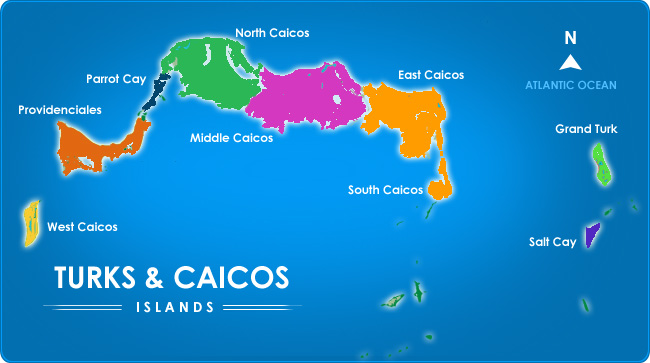Home to some of the best beaches in the world, breath taking waters, world famous diving and some of the best deep sea fishing around, it is little wonder that the Turks and Caicos Islands are one of the Caribbean’s worst kept secret. Just a short flight from the US mainland, they are easily accessible whilst remaining unspoiled and peaceful all year round.
The history of the islands dates back to around 700AD, where migrants from the Dominican Republic and Haiti first arrived. They were largely undisturbed for hundreds of years, developing their own unique culture and traditions. The inhabitants were known as Lucayans, they grew some root crops and hunted and fished the islands. A number of pottery artifacts have been found from the period.
The local population was decimated by the Spanish in 1512. Slave traders and conquistadors raided the islands frequently, enslaving the Carib people and transporting them around the Spanish empire or back to Spain. Just a year after the first sighting of the island by a European, the archipelago was completely void of Lucayans.
Over the next three centuries the islands were fought and contested over by the Spanish, French and English, frequently changing hands. Despite, or perhaps because of, the frequent changeovers, none of the imperial powers established any form of settlements meaning the islands remained largely uninhabited for at least a hundred years.
Pirates used the Turks and Caicos Islands to hide from Spanish authorities, attacking their treasure gallons that were transporting spoils to Spain from the rest of the Caribbean. They were the only visitors to the islands until the late 1600s when the first colonies were properly established.
The shallow waters around the islands attracted British salt collectors, who found their trade far easier than in Bermuda. The collectors inhabited the islands through the summer months whilst the salt was easy to rake. The colonisers chopped down a huge amount of the indigenous forest in order to discourage rainfall, which made salt mining difficult. The salt mined made its way through the Caribbean to the American mainland and beyond.
With the slave trade in full motion, agriculture first appeared on the Turks and Caicos Islands for the first time in the late 1700s. American loyalists, fleeing America after the revolution, were granted large swathes of land across the islands to farm. They imported hundreds of slaves and formed cotton plantations, which were initially very successful. The industry collapsed following years of hurricanes however, and the loyalists had deserted the islands by as early as 1820.
The whole 18th century was spent in political turmoil however, with a number of legal battles, invasions and changing of hands. The Spanish and French seized the islands at the start of the century, only to be expelled some four years later by Bermudian forces.
Both Bermuda and the Bahamas (both colonies) fought over ownership of the islands, whilst Britain maintained that colonies could not own colonies and the Turks and Caicos were for common use by all.
Until 1848, the islands were under the jurisdiction of the Bahamas when the islands were made a separate colony following a petition by the inhabitants. By 1873 the island had been annexed to Jamaica as the previous arrangement was deemed too expensive. It remained this way until 1959, when the Turks and Caicos were granted their own administration.
Jamaica received independence from Britain in 1962 and the Turks and Caicos became a crown colony. The islands were governed by the Bahamas until the Bahamas gained independence in 1973, at which point the Turks and Caicos received their own governor.
Today the islands are a British Oversees Territory, known for its tourism and an offshore financial centre. Its home rule was temporarily suspended in August 2009 although has since been restored.
Tourists visit the island every year for its beaches, water sports and exceptional deep sea fishing. For more information, or to book your deep sea fishing holiday, search ‘deep sea fishing Caribbean’. You’ll find oceans teaming with wildlife, great beaches, sparkling waters and everything you could ever wish for from a fishing vacation!

